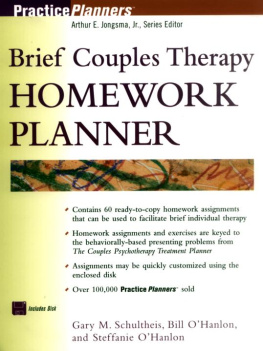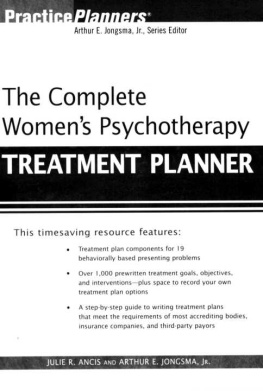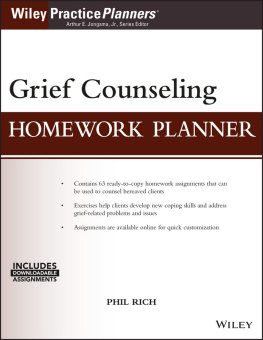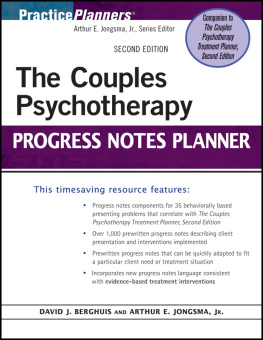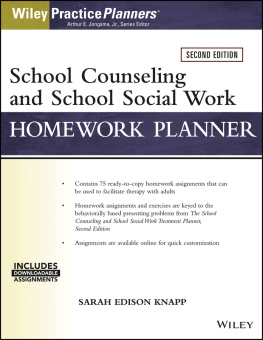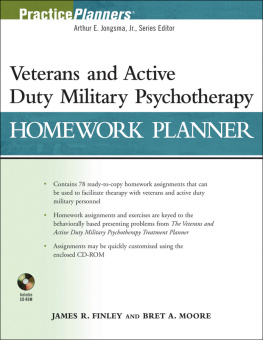Gary M. Schultheis




Thanks to Kelly Franklin for another chance to work with her. Thanks to Bill and Steffanie O'Hanlon for agreeing to co-author this book. Their creativity adds a dimension that I could never have brought to the book on my own. Thanks to my parents, Bill and Mary Ann, who have supported me even when I didn't make sense. And finally, thanks to my wife, Sandy, who is always there when I need her.
GMS
Thanks to Gary for his patience and inspiration. To Carol, Jennifer, and Kim. And most of all to Bill, for his love and devotion, particularly through the hard parts.
SO'H
Thanks to Gary for including me in the project (sorry for the challenge that I offer as a collaborator, this is number sixteen, so I'm used to my process). Kelly Franklin gave her continued enthusiasm and support. Thanks to those couples who have been trusting enough to let me in on their dilemmas and who have been open to trying out these concepts. To my brother Paul, best wishes on your journey to reclaim yourself and thank you. Special thanks to Steffanie for teaching me a lot about the noun and verb aspects of love and relationship. (I'm still working on those boundaries, okay?)
BO'H
Practice Planner
Series Preface
The practice of psychotherapy has a dimension that did not exist 30, 20, or even 15 years ago-accountability. Treatment programs, public agencies, clinics, and even group and solo practitioners must now justify the treatment of patients to outside review entities that control the payment of fees. This development has resulted in an explosion of paperwork.
Clinicians must now document what has been done in treatment, what is planned for the future, and what the anticipated outcomes of the interventions are. The books and software in this Practice Planner series are designed to help practitioners fulfill these documentation requirements efficiently and professionally.
The Practice Planner series is growing rapidly. It now includes not only the original Complete Psychotherapy Treatment Planner and the Child and Adolescent Psychotherapy Treatment Planner, but also Treatment Planners targeted to specialty areas of practice, including: chemical dependency, the continuum of care, couples therapy, older adult treatment, employee assistance, pastoral counseling, and more.
In addition to the Treatment Planners, the series also includes TheraScribe: The Computerized Assistant to Psychotherapy Treatment Planning and TheraBillerTM: The Computerized Mental Health Office Manager, as well as adjunctive books, such as the Brief Therapy, Chemical Dependence, Couples, and Child Homework Planners, The Psychotherapy Documentation Primer, and Clinical, Forensic, Child, Couples and Family, and Chemical Dependence Documentation Sourcebooks-containing forms and resources to aid in mental health practice management. The goal of the series is to provide practitioners with the resources they need in order to provide high-quality care in the era of accountability-or, to put it simply, we seek to help you spend more time on patients, and less on paperwork.
ARTHUR E. JONGSMA, JR.
Grand Rapids, Michigan
Nmovalm
SEXUAL ISSUES AND PROBLEMS
FAMILY, STEPFAMILY, AND PARENTING PROBLEMS
Introduction
While it is common for mental health practitioners to complain about the changes that managed care has forced them to make in their work, we applaud one change that we believe is irreversible. It is now expected that therapy produce clear results, usually in a relatively short time. This expectation has forced therapists to become both more flexible and more creative in their practice. Homework assignments are becoming more and more attractive to practitioners as a way to facilitate change, regardless of their therapeutic approach. Homework expands on work done in a session and allows clients to take what has been discussed in therapy and try it in the real world. We hope that this book will be helpful to those who are just learning to use homework assignments. In addition, it offers some new ideas to those who are experienced with homework but want to expand their use of this technique.
Brief therapy is especially appropriate for couples work. Most couples seek therapy only when their relationship is in serious trouble. If we don't offer help and activities to make some rapid changes, there is often no relationship left to work with.
We use homework assignments for many reasons, including that homework:
Introduces change to the situation
Encourages a spirit of experimentation

